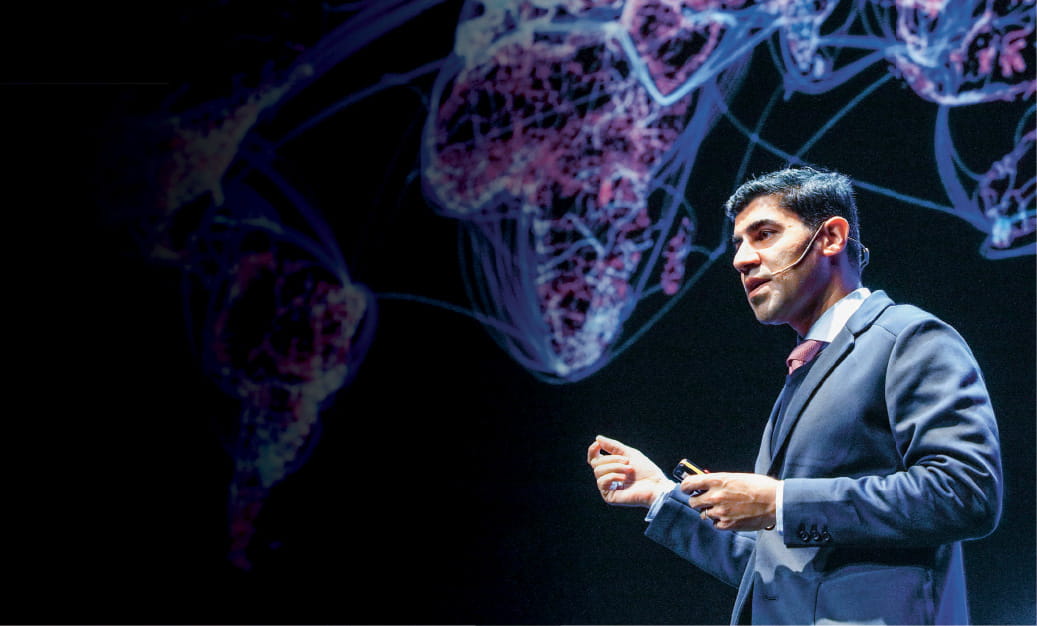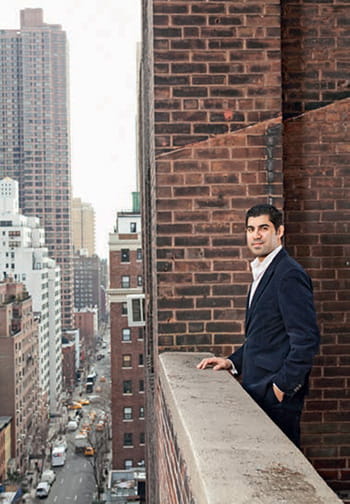Stories > An Unofficial Ambassador
An Unofficial Ambassador
Multi-hyphenate Parag Khanna talks about Singapore’s role on the world stage and his admiration for the country.
BY LOW SHI PING
PHOTOS PARAG KHANNA & MARK MAHANEY

In his book Connectography, Dr Khanna envisions a global future shaped more by connectivity than by geographical or political boundaries, in which the world has the potential to pull together in new ways as competition over resources loses relevance.
arag Khanna, an American who is now a Singapore permanent resident, was born in India, but grew up in the United Arab Emirates, New York, and Germany. He moved to Singapore in 2012 (he bought a one-way ticket here), but the country had been on his radar since the early 2000s.
From 2004 to 2007, he visited 50 countries, including important emerging markets such as Brazil, Kazakhstan, and Indonesia. He profiled them all, and arrived at the conclusion that they each wanted their own Lee Kuan Yew – the former prime minister of Singapore who was largely responsible for the nation’s success today.
Khanna points out that for most of his life, people wanted to know about America; now, the spotlight is on Asia. He is keen to be part of this change in tide.
“Twenty years ago, we would not have expected the Prime Minister of the UK, Theresa May, to say the UK can be the Singapore of Europe. What’s ironic is that this used to be a British colony. I am now seeing an intellectual reversal, with Western countries saying, ‘We wish we were run like Asian countries such as Singapore’.
“My early years here were the times of post-9/11. America’s wars were failing and terrorism was on the rise. There was increasing need for a good quality leader in a turbulent world,” says Khanna, speaking from his experience as a senior geopolitical adviser to the US Special Operations Forces in Iraq and Afghanistan in 2007.
Earlier this year, he published Technocracy in America, a book on how large democracies can learn from the Singaporean and Swiss political systems. Khanna’s expertise and thought leadership in global economic and political strategy, and sustainable urban development, saw him named a Young Global Leader of the World Economic Forum. Following his move here, he joined the Lee Kuan Yew School of Public Policy as a senior research fellow at the Centre on Asia and Globalisation.
Part of the reason for his resolve to stay is that his personal mission is to help other countries become more like Singapore. He has served on the Committee on the Future Economy and is not ruling out taking on a more official governmental advisory role in time to come.
“If The Difference Between Success And Failure Hinges On Connectivity, The Most Connected Cities And People Are The Winners.”
Dr Parag Khanna, Global Strategist
Khanna is also recognised for coining the term “connectivity revolution”, the definition of which he is particular about. “It is the worldwide acceleration and pervasiveness of infrastructure like transportation, energy, and communications. Connectivity has physical foundations; people wave their phones in the air and say they are connected, but they don’t appreciate what connectivity is. This revolution is the reason why importance is shifting away from national boundaries and towards infrastructure and supply chain networks.
“It is the single most powerful force in human history. Nothing else is remotely as stable, consistent, and fundamental. Next to evolution, connectivity is the single most fundamental feature of human society.”
This revolution has overturned the adage that “geography is destiny”. In the past, where one was born determined what one could achieve; the geography of a place determined its importance and potential for influence. Now, the single most important determinant of success is how digitally connected one is. To Khanna, the implications of this on Singapore are obvious. “If the difference between success and failure hinges on connectivity, the most connected cities and people are the winners. Singapore, as one of the world’s most connected cities, is well placed in the world order.”

Dr Khanna lectures frequently at international conferences and gives tailored briefi ngs to government leaders and corporate executives on various topics, including global trends and scenarios, and systemic risks and technological disruptions.
Singapore, he elaborates, is connected to Asia and the rest of the world through financial markets, logistics, and economics. “It has no oil reserves but has the largest oil refineries. It is a big shipbuilder but it does not export any manufactured goods.” He says the island state needs to deliberately continue to nurture, expand, and enhance this connectivity. It already prioritises trade agreements with major economies such as Japan, India, and China, which he sees as a great national strategy. “Connectivity gives you resilience. If trade ties with one country are weak, strong ones with another can balance things out,” he adds.
Big countries like China and smaller ones like Iran and Saudi Arabia learn from Singapore’s best practices – particularly in the areas of economic modelling and infrastructure, as well as leadership and governance, he adds.
It’s not all work and no play for him, though. He’s taken time to note little things about local culture and form his own opinions of them. “One quirk is the word ‘lah’, which I still can’t get used to,” he says. “It makes me laugh. Many of the Singaporeans I know use it deliberately as a fun sort of self-identifier, because it isn’t particularly necessary – and that just makes me laugh even more!”
He now counts a number of Singaporeans among his good friends. One of these is Bharat Khemani, who runs BIA Athletics and is his personal trainer.
“Bharat’s stories about how national service made him tougher and more focused have been inspiring in my support for Western countries to have similar national service schemes,” Khanna says, adding that Khemani is a great example of the sort of hungry young entrepreneur that Singapore is eager to nurture: in his mid-20s, developing his own line of apparel, hosting public events to promote fitness through callisthenics competitions, and giving nutritional coaching to clients.
Another friend is Kishore Mahbubani, dean of the Lee Kuan Yew School of Public Policy. Their friendship began prior to Khanna’s move to Singapore, and he is grateful for Prof Mahbubani’s generous support and thought leadership in Singapore and abroad. There is also Nick (Nicholas) Fang. Khanna says: “I met him through the Singapore Institute of International Affairs, of which he is executive director. He’s a wonderful person and a great example of a well-rounded global Singaporean who represents a high quality of citizenship and exemplifies giving back to the sports and media communities.”
Khanna adds: “Singaporeans always tell me how surprised they are that we have chosen to settle here, though they seem thrilled by our degree of commitment to Singapore. I am surprised that they are surprised. After all, the demand to live in Singapore far exceeds the supply of immigration allowed. Objectively speaking, Singapore might be the best place in the world to live.
“Besides, Asia is where the action is. I want to live in and explore it. In doing so, I will also go to other important centres around the world to tell them what’s happening in Asia and in Singapore.”
